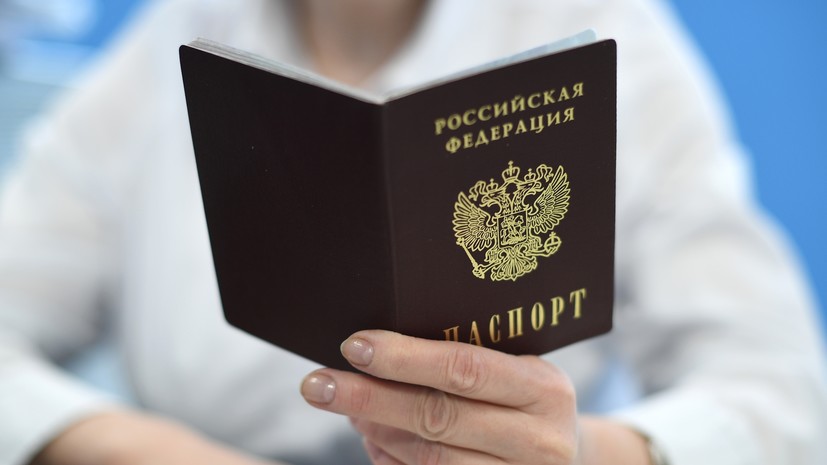Russian President Vladimir Putin has submitted to the State Duma a bill "On the Citizenship of the Russian Federation."
The document was published in the electronic database of the department.
“The draft law retains a conceptual approach to understanding the institution of citizenship of the Russian Federation as a stable legal relationship between a person and the state, expressed in the totality of their mutual rights and obligations,” the explanatory note says.
The provisions of the document are focused on granting Russian citizenship to persons who live in Russia, and are also capable of "organically joining the system of positive social ties and becoming full-fledged members of Russian society."
The document also prescribes the transfer of a number of powers to grant Russian citizenship to the Ministry of Internal Affairs and the Ministry of Foreign Affairs.
It follows from the explanatory note that it is planned to leave the admission to Russian citizenship in an exceptional manner under the jurisdiction of the head of state.
It is planned that in this case it will be about the veterans of the Great Patriotic War, who were citizens of the former USSR, and about persons who have special services to Russia, as well as persons of interest to the country.
The procedure for granting citizenship to the Russian Federation on an exceptional basis is also given in the document.
It is noted that the corresponding appeal must be addressed to the president, it must be "motivated, substantiated and contain information about the special merits of a foreign citizen or stateless person before the Russian Federation."
It is clarified that in this case, merit is understood as outstanding achievements in the cultural and humanitarian sphere, in the field of science, technology, production, sports, a significant contribution to the development of society and the economy, as well as ensuring the defense and security of the Russian Federation.
In turn, the Ministry of Internal Affairs of Russia and the Ministry of Foreign Affairs of Russia are endowed with the right to make decisions on other categories of persons.
The document says that this will reduce the period for considering citizenship issues from one year to three months, and will also ensure a more logical functioning of the decision-making system on citizenship in general.
Along with this, the document expands the list of crimes, the commission of which entails the termination of citizenship.
“Along with crimes of a terrorist nature, the list includes some serious crimes against the state, as well as crimes in the sphere of trafficking in narcotic drugs and psychotropic substances,” the explanatory note says.
Leonid Kalashnikov, head of the Duma Committee on CIS Affairs, Eurasian Integration and Relations with Compatriots, said that the State Duma plans to adopt a bill on citizenship in early 2022.
“I saw the text, moreover, I participated in its development together with the interdepartmental commission under the President of Russia, we developed it for a long time after the amendments were made to the Constitution.
He will be on my committee, ”TASS quoted him as saying.
Also on russian.rt.com A draft on sanctions against foreigners who violated the rights of Russians was submitted to the State Duma
Meanwhile, Artyom Turov, Deputy Chairman of the State Duma Committee for CIS Affairs, Eurasian Integration and Relations with Compatriots, in an interview with RT, told the details of the bill submitted to the State Duma by the President of Russia.
According to the parliamentarian, the development of the document is due to the implementation of the Concept of State Migration Policy, and is also aimed at updating the legislation on citizenship in accordance with the provisions of the Constitution.
“One of the main issues is increasing the efficiency of law enforcement practice in the field of citizenship.
The bill provides for a reduction in the number of requirements for more than 20 categories of persons when applying for Russian citizenship.
In fact, this is obtaining citizenship in a simplified regime, ”Turov said.
The deputy noted that at the same time, the institution of recognition as a citizen of Russia is being updated.
"Not only the citizens of the former USSR who lived in the territory of the Russian Federation as of February 1992, but also a number of other persons who could, within the framework of the adoption of the law, exercise this right," the parliamentarian explained.
Turov stressed that when obtaining citizenship, a person must know the Russian language, know the history of Russia, of course, comply with the norms of the Constitution and not pose a threat to the country.
“A list is being determined, including crimes due to which a citizen may lose Russian citizenship.
It should be noted here not only the issue related to terrorism, but also grave crimes against the state itself, as well as crimes in the sphere of drug trafficking, psychotropic substances, "the interlocutor of RT concluded.
In his opinion, the law meets the needs of society and compatriots.

